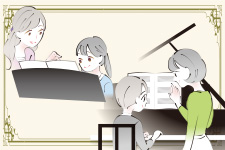Interviews to 4 Young Piano Teachers
2017/07/15 | コメント(0)
| トラックバック(0)
|
 Piano teachers help children cultivate their music lives in the long run, and at the same time, bring cultural richness to their local areas. A professional music teacher and a local leader, these are what we expect for them. Then, how do they become professional? What should young piano teachers prepare? Here are interviews of some of the successful young teachers.
Piano teachers help children cultivate their music lives in the long run, and at the same time, bring cultural richness to their local areas. A professional music teacher and a local leader, these are what we expect for them. Then, how do they become professional? What should young piano teachers prepare? Here are interviews of some of the successful young teachers.Ayumi Iguchi (the representative of Oto-no-Hibiki Kanazawa Station) experienced studying and teaching at the same time. She started teaching piano when she was a student of a graduate college. At first, she opened her website, distributed leaflets of her piano studio, and performed at kids / family concerts at local cafes and public squares. In the following year, she moved back to her home town, and went to the college once a week from Kanazawa to Aichi. "There were a lot of awareness and discoveries through these studying-teaching experiences", says Iguchi. It encouraged her to realize the necessity of time management. And her teaching experiences enabled her to reexamine how to learn effectively at piano lessons. She had tens of students at time of her graduation, and now, a number of students are studying with her.
Akika Shinoda began to teach piano at a local music instruments shop soon after her graduation from music college. One day, she was told by an adult student, "Oh, our new teacher is so young ('sensei')". Then she thought, "How should I behave to be called 'sensei (teacher/master)' by students twice as elder as me?". She became conscious about what to wear, how to talk, and how to teach professionally. After all, she realized that those were important as long as she work and live as a teacher. Now she is teaching a number of students including the one mentioned above, and spend nice time together.
Junko Emoto (the representative of Matsudo-Koala-no-Mori Station) began teaching when she was a senior at music college, at a local music shop first and at home after marriage. After giving birth to a boy at the age of 28, it became difficult for her to take students in the evenings. The number of students went a little bit less, but instead, she obtained time for local activities and then established a PTNA Piano Station in her town. 2 years later, she decided to study further at a graduate college, where she had respectful friends and lessons. Now she is teaching temporarily at the Senzoku Gakuen College of Music in the mornings. With the support of her husband, school teachers, neighbors, etc., she keeps working while raising up two children who are 8 years apart.
Yuki Muto started working as a teacher at one of the Yamaha music studios after graduation. One day a girl asked her to teach individually, and thus she started to teach at home at the same time. It eventually helped her become independent one and half year later. After giving birth, two other teachers help her look after 40 students. At present, she teaches 3 times a week, while raising up a 5-year-old daughter. According to her, piano teacher is an unparalleled job that can be coordinated in various ways to fit into one's own life style.
PTNA offers a variety of opportunities for young piano teachers. How about taking a challenge to the Teacher's License Program, participating in piano seminars and study groups, observing and participating in PTNA Piano Step / PTNA Piano Competition, joining in PTNA.... you will be able to start from anywhere you want.
【GoogleAdsense】